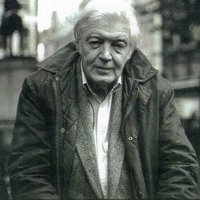The late Colin Ward showed that liberty isn't a Left/Right issue
Reason magazine's Hit & Run blog has a post up noting the passing of Colin Ward, a British left-anarchist. I'm especially sorry that this is my first encounter with Ward, since he apparently was best known not for looking to some utopian future, but for examining the here and now, as well as the past, for examples of real-life voluntary, cooperative alternatives to state institutions. His aim was to not just argue that an authoritarian state is immoral, but to demonstrate that it is and has been unnecessary.
People like Ward interest me not only because of his practical interest in applied voluntarism, but also because he -- a man who was as critical of social democrats as he was of Margaret Thatcher -- was a living, breathing exemplar of the principle that the real political divide isn't between Left and Right, but between liberty and authority. This may be a tough sell in the simple-minded world of Team Blue/Team Red America, but it's apparent that there are believers in liberty on both the Left and the Right, and that these people have more in common with one another than they do with their supposed comrades who are more interested in top-down control than in freedom.
The connection is especially apparent among out-and-out anarchists like Ward and, say, David D. Friedman, the anarcho-capitalist (and son of Milton). When you remove the coercive power of the state from the equation, not only are their criticisms of authoritarianism largely complementary, but their hyphenations (left- and -capitalist) become little more than expressions of how they would like to arrange their personal affairs, not something they want to force on one another.
As you move away from anarchism, the introduction of some degree of state power complicates things by raising the likelihood that somebody will be coerced to do things they don't want to do. But it's notable that libertarian-socialist Nat Hentoff, after losing his Village Voice column, found a home at the libertarian Cato Institute, which is often accused of being "right-wing." It's also worth noting, on the other hand, that Senators Orrin Hatch and Dianne Feinstein, supposed cross-aisle rivals, so frequently seem to find common cause on odious, authoritarian legislation.
Whatever the details of their differences, advocates of liberty really do have more in common with one another, as do advocates of authority. The real connections cut across the artificial Left/Right divide.
The challenge for liberty advocates, whether of the supposed Left or Right, is to look beyond supposed allies who mouth their favorite platitudes while forever increasing the power of the state over their lives -- and to get past unfamiliar terminology to find allies they didn't know they had.
As the late Colin Ward demonstrated, Left and Right don't matter; liberty and authority do.
People like Ward interest me not only because of his practical interest in applied voluntarism, but also because he -- a man who was as critical of social democrats as he was of Margaret Thatcher -- was a living, breathing exemplar of the principle that the real political divide isn't between Left and Right, but between liberty and authority. This may be a tough sell in the simple-minded world of Team Blue/Team Red America, but it's apparent that there are believers in liberty on both the Left and the Right, and that these people have more in common with one another than they do with their supposed comrades who are more interested in top-down control than in freedom.
The connection is especially apparent among out-and-out anarchists like Ward and, say, David D. Friedman, the anarcho-capitalist (and son of Milton). When you remove the coercive power of the state from the equation, not only are their criticisms of authoritarianism largely complementary, but their hyphenations (left- and -capitalist) become little more than expressions of how they would like to arrange their personal affairs, not something they want to force on one another.
As you move away from anarchism, the introduction of some degree of state power complicates things by raising the likelihood that somebody will be coerced to do things they don't want to do. But it's notable that libertarian-socialist Nat Hentoff, after losing his Village Voice column, found a home at the libertarian Cato Institute, which is often accused of being "right-wing." It's also worth noting, on the other hand, that Senators Orrin Hatch and Dianne Feinstein, supposed cross-aisle rivals, so frequently seem to find common cause on odious, authoritarian legislation.
Whatever the details of their differences, advocates of liberty really do have more in common with one another, as do advocates of authority. The real connections cut across the artificial Left/Right divide.
The challenge for liberty advocates, whether of the supposed Left or Right, is to look beyond supposed allies who mouth their favorite platitudes while forever increasing the power of the state over their lives -- and to get past unfamiliar terminology to find allies they didn't know they had.
As the late Colin Ward demonstrated, Left and Right don't matter; liberty and authority do.
Labels: just cool, libertarianism





1 Comments:
I'd add that the same thing applies to the atheist/Christian divide, although I'm undoubtedly the Christian minority on this one.
American Christians typically approach government from one of two perspectives. Desiring to help those in need, they use the government to redistribute wealth. Others, motivated to see repentance from sin, use the government to define and enforce moral behavior.
Both positions use the coercion of the state to enforce religious practice. Neither position draws people to Christ, and in fact, interferes with the work of the Holy Spirit.
If Christians truly desire to draw others to Christ, they will not force society at large to fulfill their responsibilities. Moral laws do not change people, they only create self-justified hypocrites or criminals.
Post a Comment
Links to this post:
Create a Link
<< Home